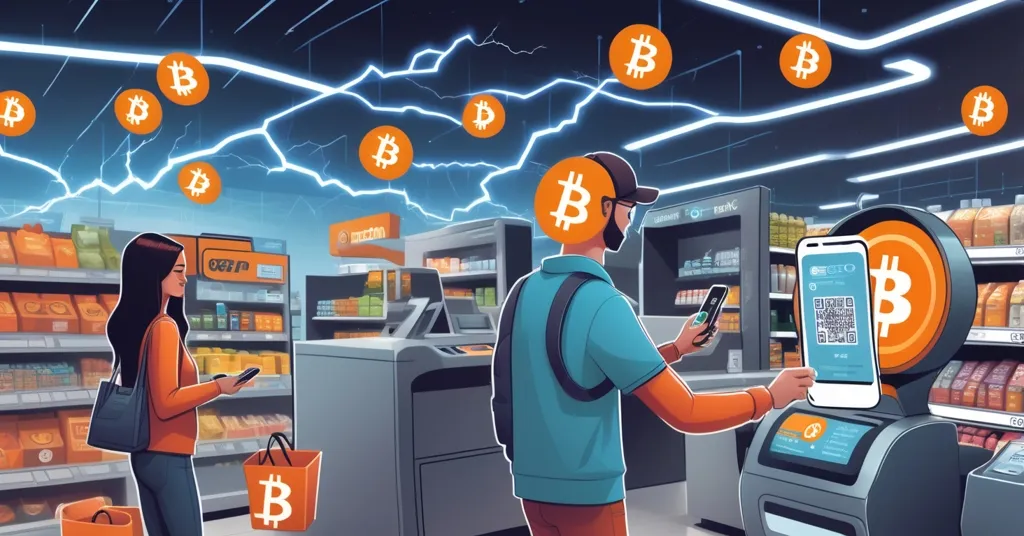Spar Embraces Bitcoin in Switzerland: A Leap Towards Crypto Retail Integration

International Grocery Chain Spar Pilots Bitcoin Payments in Switzerland
Can you imagine buying your groceries with Bitcoin? Spar in Switzerland is making this a reality by starting to accept Bitcoin at its store in Zug. This pilot program, facilitated by DFX Swiss using the OpenCryptoPay tool, could signal a broader acceptance of cryptocurrencies in everyday retail transactions if successful.
- Spar accepts Bitcoin in Zug, Switzerland.
- Payments enabled by DFX Swiss’s OpenCryptoPay tool.
- Transactions via the Lightning Network.
- Potential global expansion if pilot succeeds.
DFX Swiss announced this initiative on April 17 via LinkedIn, showcasing Spar’s progressive step towards integrating Bitcoin into its payment systems. The store in Zug is now listed on BTC Map, a platform tracking businesses worldwide that accept Bitcoin, putting Spar on the map—literally—as a pioneer in crypto-friendly retail.
Customers at Spar’s Zug location can now pay for their groceries using Bitcoin, thanks to the Lightning Network, which makes Bitcoin payments fast and cheap by handling them off the main Bitcoin network. All it takes is a scan of a QR code at checkout, making the process as seamless as using traditional cash or cards. This pilot program is a testament to the growing trend of businesses embracing cryptocurrency, not just in tech hubs but in mainstream retail environments.
DFX Swiss’s OpenCryptoPay tool is at the heart of this initiative. It uses an open peer-to-peer (P2P) standard for in-person crypto payments, a move that could revolutionize how we think about and use Bitcoin for everyday purchases. The director of Bitcoin Association Switzerland, Rahim Taghizadegan, demonstrated the simplicity of the payment process, emphasizing that it involves scanning a static QR code and sending satoshis, the smallest unit of Bitcoin. This ease of use could lead to broader adoption if successful.
Spar’s decision to pilot Bitcoin payments isn’t happening in a vacuum. Switzerland has been a hotbed for cryptocurrency adoption, with initiatives like the city of Lugano accepting Bitcoin and Tether for municipal fees. The country’s Crypto Valley, valued at $593 billion in 2024, underscores its significant role in the blockchain ecosystem. Spar’s move aligns with this crypto-friendly environment, potentially setting the stage for a broader rollout across its network of over 13,900 stores in 48 countries.
This isn’t Spar’s first dance with Bitcoin. The chain had previously accepted Bitcoin at its store in Arnhem, Netherlands, since 2014. Other retailers have followed suit, with Pick n Pay in South Africa rolling out Bitcoin payments across its 1,600+ stores in April 2023, and even U.S. giants like Whole Foods and Starbucks experimenting with Bitcoin through third-party apps.
The Lightning Network, which Spar is using for its Bitcoin transactions, has seen significant business integration in 2024, according to Fidelity Digital Assets’ research. This layer-2 solution for Bitcoin allows for faster and cheaper transactions, making it ideal for retail environments. It’s not just about speed and cost; the Lightning Network is also a yield-bearing network, allowing users to retain control of their Bitcoin while potentially earning from it.
While we celebrate this step towards mainstream crypto adoption, it’s crucial to keep our feet on the ground. The potential for global expansion is exciting, but it’s contingent on the success of this pilot. And let’s not forget the broader implications: if Spar expands Bitcoin payments globally, it could significantly boost crypto adoption, given its extensive network. However, we must also consider the challenges, such as regulatory hurdles and the volatility of cryptocurrencies, which could impact consumer and merchant confidence.
As we navigate this financial revolution, it’s essential to remain optimistic yet realistic. Bitcoin and blockchain technology hold immense potential to disrupt the status quo, promoting decentralization, freedom, and privacy. Yet, we must also acknowledge the risks and limitations, ensuring that our enthusiasm is tempered with a critical eye.
Imagine walking into a Spar store and paying for your groceries with Bitcoin. Sounds futuristic, right? Next time you’re at Spar, you might just pay for your bread with Bitcoin. Talk about breaking bread in a new way!
While some argue that Bitcoin is too volatile for everyday transactions, Spar’s move could prove them wrong and show the world that crypto is here to stay. However, we must also consider counterarguments to Bitcoin’s use in retail, such as concerns about scalability, environmental impact, and regulatory challenges. The future of cryptocurrencies in retail will depend on how these issues are addressed.
“This SPAR location is among the first supermarkets in Switzerland where you can pay directly at the checkout using Bitcoin (via LNURL), thanks to our new #OpenCryptoPay solution – an open P2P standard for in-person crypto payments,” – DFX Swiss
So, what does this mean for the future of retail and cryptocurrency?
It marks a potential expansion of cryptocurrency use in retail, which could lead to broader adoption across Spar’s global network, enhancing the visibility and practical use of Bitcoin.
How does the Lightning Network facilitate Bitcoin payments at Spar?
The Lightning Network makes Bitcoin payments fast and cheap by handling them off the main Bitcoin network. At Spar, customers can pay by scanning a QR code at checkout, making the process swift and user-friendly.
What are the implications for crypto adoption if Spar expands Bitcoin payments globally?
If Spar expands Bitcoin payments globally, it would significantly boost crypto adoption, given Spar’s extensive network, potentially normalizing Bitcoin as a payment method worldwide.
What other retailers have adopted Bitcoin payments, and how do their implementations compare to Spar’s?
Other retailers include Spar in the Netherlands, Pick n Pay in South Africa, and U.S. chains like Whole Foods and Starbucks. Spar’s implementation in Zug uses the Lightning Network similar to Pick n Pay, while U.S. chains use third-party apps to convert crypto to fiat at checkout.
What role does DFX Swiss play in this pilot program?
DFX Swiss enables Bitcoin payments at Spar through its OpenCryptoPay tool, facilitating a seamless in-person crypto payment experience using an open P2P standard.



